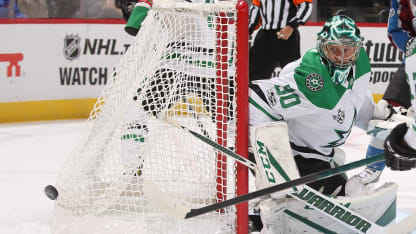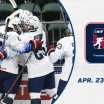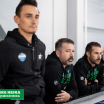No hard feelings: Bishop not dwelling on Colorado aftermath
Displeased over being pulled early in Tuesday's loss, the goaltender says he's turned the page

© Michael Martin/Getty Images
But the aftermath of Dallas Stars' head coach Ken Hitchcock's decision to pull starter Ben Bishop during a TV timeout after the second period of what would turn out to be a 5-3 loss to the Colorado Avalanche on Tuesday evening provides a window onto the sometimes complex decisions that go into building a team. Or more specifically -- building a winning team.
Over time, perhaps, this flashpoint will emerge as a kind of turning point for a Stars team that saw a four-game winning streak come to an end in what was the first of a five-game western road trip.
"It's all what's best for the team. So you do what's best for the team," Hitchcock said Wednesday before the team flew to Edmonton, where they'll play Connor McDavid and the Oilers on Thursday night.
Bishop will be the starter in that game -- a decision made prior to the start of the trip, and which remains unaffected by what transpired Tuesday in Denver.
"If you coached in this business worried about conflict, you wouldn't last five minutes," Hitchcock said.
Certainly there were conflicting views onL'Affaire Bishop.
The veteran netminder was visibly unhappy with the decision to change goaltenders with the Avalanche up 3-2 just 6:12 into the second period, and said as much several times during his postgame interview.
Some 12 hours later, Bishop was already focusing on the Oilers and getting back to work.
"You don't change anything," he said. "You prepare the same way every single game, no matter what the situation is. Whether you had a shutout or you get pulled, you still prepare the same way. Nothing changes."
And while you never get used to being yanked from a game as a goaltender, you do learn to move on quickly, he said.
"I've been pulled in every type of situation," said Bishop. "You don't obviously get used to it but you know how to move on pretty quick because the only thing that matters is the next two points. If you sit there and dwell on the last ones, you're going to be behind the eight ball."
Bishop had not spoken to Hitchcock during or after the game, or in the hours before the team's flight on Wednesday, and Hitchcock said that if they do chat, it's not something that will be publicized.
"If I go down the road, you'd be the last to know," he said.
Pretty sure he wasn't kidding.
"That's a private matter that we'll decide how we're going to deal with it and move from there," the coach added.
Bishop deferred to his head coach.
"He's been a coach in this league for a long time, that's what he gets paid for," Bishop said. "He gets to make those decisions. I have to play when I get the opportunity to play. There's really not much to really discuss. I'm competitive I want to be in there. I want to help this team win, but at the end of the day, it's his decision, so I might disagree with it, but at the same time, that's why he's won so many games in this league and whatnot. So I think we'll both move on from it pretty quick."
And really, that's going to be the interesting -- if not the most important -- part is how do Bishop and Hitchcock, and the rest of the Stars, move forward as they prepare for Edmonton, and then Calgary 24 hours later before finishing up this trip with dates in Vancouver and Winnipeg?
If we accept Hitchcock's assertion that a team gets built on the road, and it gets built through adversity, and if we also accept that conflict is a form of adversity, then there is an opportunity here, or at the very least, a test.
Longtime NHL netminder and analyst Marty Biron said he thought Bishop was "average at best" against the Avalanche, but was nonetheless surprised that Hitchcock made the move, given how well Bishop had been playing (he entered the game with a 5-1-0 record and .928 save percentage).
"It was almost Mike Keenan-ish," Biron said, evoking the mercurial head coach known for repeated -- some would say obsessive -- yanking of his goalies back in the day.
Still, Biron was also surprised at Bishop's comments after the game, where he challenged the decision.
Biron recalled similar situations in his playing career where good communication with coaches in Philadelphia (John Stevens) and in New York (John Tortorella) helped smooth over rough moments brought on by being pulled when Biron didn't feel it was called for. Ultimately, that communication helped the team.
"I think they can both learn from it," Biron said. "That's where they've got to go from here."
Corey Hirsch was the goaltending coach with St. Louis when Bishop first came into the league and worked for a number of years with Hitchcock with the Blues (along with having played for Hitchcock as a junior star in the Western Hockey League).
The former NHL and Canadian National Team netminder also felt Hitchcock and Bishop could have handled things differently.
Hitchcock, perhaps, should have spoken to Bishop between periods, or right after the gam -- thereby defusing the situation, Hirsch suggested.
And while there were clearly some defensive breakdowns that contributed to the goals Bishop allowed, Hirsch said Bishop needed to acknowledge his own role in the team being behind.
On the Avalanche's second goal, for instance, Bishop got caught up handling the puck behind his net and never got back into position as Matt Nieto scored to give the Avs a 2-1 lead at the time. The third goal -- and the one that hastened his departure -- came shortly after the Stars had tied the game.
"If I was Ben I'd have been (ticked), too," said Hirsch, who is currently providing analysis for the Vancouver Canucks. "But he's got to take responsibility, too."
Ultimately, Hitchcock is looking to give his team a jolt and, historically, he's a coach that doesn't meddle too much with the goaltenders, Hirsch said.
"Knowing Hitch, he was probably just trying to get something going," Hirsch said.
"Ben is a good goalie," Hirsch added. "His numbers are great. He's playing really well."
In short, hug it out and move on seems to be the best strategy here.
"Just two competitive people," Bishop acknowledged. "He's trying to make the right decision for the team. So I'm not going to fault that. I want to stay in, maybe selfishly, but he's that's why he's the coach, he gets to make those decisions.
"We have an important game in Edmonton, so we're not going to sit here and dwell on this."
This story was not subject to approval of the National Hockey League or Dallas Stars Hockey Club. You can follow Scott on Twitter @OvertimeScottB, and listen to his Burnside Chats podcast here.


















